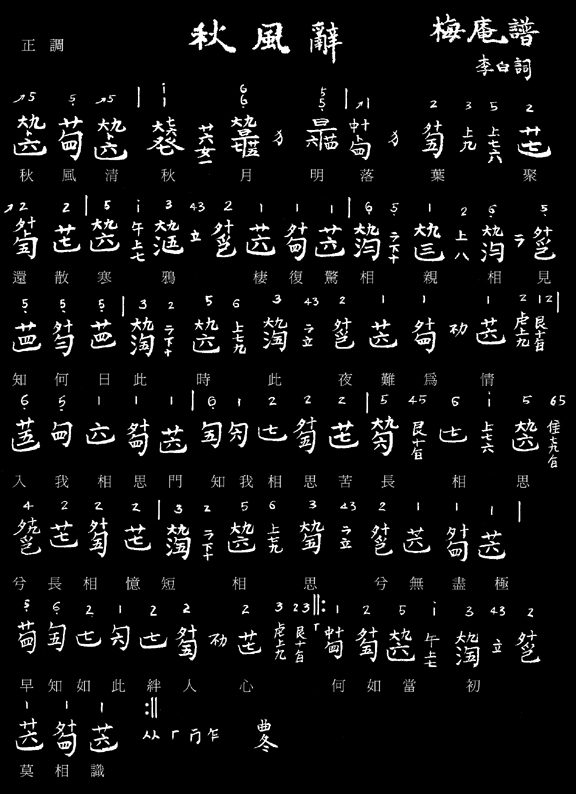|
Ode to Autumn Wind (Qiu Feng Ci) in two versions and the translations of their lyrics Perform and dapu by Peiyou Chang 和文注音琴譜 Hewen Zhuyin Qinpu *1  梅庵琴譜 Meian Qinpu *2  Translation of the lyrics: 秋風起兮白雲飛 草木黄落兮雁南歸 蘭有秀兮菊有芳 携佳人兮不能忘 泛樓船兮濟汾河 横中流兮揚素波 簫鼓鳴兮發棹歌 歡樂極兮哀情多 少壮幾時兮奈老何 Liu Che (Han Dynasty Emperor, 156 - 87 BC) *3 Autumn winds rise, white clouds fly, Grass, trees turn yellow and fall, geese return south. The orchids are radiant, the chrysanthemums, fragrant; Thinking of the graceful lady, I cannot forget her. Sailing in a pavilion boat, we cross the Fen River, Cutting across the current, white ripples scatter. Fife and drums play, the oarsman's song accompany; As joys reach their end, sorrows multiply. Fleeting is the strength of youth --- helpless before old age! ---Translated by Peiyou Chang 李白詞 梅庵琴譜 Meian Qinpu 秋風清 秋月明 落葉聚還散 寒鴉棲復驚 相親相見知何日 此時此夜難為情 入我相思門 知我相思苦 長相思兮長相憶 短相思兮無窮極 早知如此絆人心 何如當初莫相識 Li bo (Tang dynasty poet, 701-762) Clean autumn wind, Clear autumn moon Falling leaves gathered then scattered Black raven rests then disturbed When can we meet and loved to each other At this moment, this night, difficult for emotion Enter my lovesick door Knowing my lovesick sorrow Long missing, long memories Short missing endless Had I known it would fetter my heart so much I'd rather we not know each other from the beginning ---Translated by Peiyou Chang
*1 Hewen Zhuyin Qinpu 和文注音琴譜 was edited around(before) 1676 by Monk Dong-gao (Xing-yue), Jiang Xing-chou 東皋禪師, 俗名蔣興疇, 字心越 (1639-1695) from Jian-su province. He
moved to Japan in 1676 and was recognized as the father of the revival of Qin study of Japan. | *2 Mei An Qin Pu 梅庵琴譜 was published in 1931, handed down by Wang Lu-bing (Yian-qing) 王魯賓 (別號燕卿), edited by Xu Zhuo 徐卓 who was the lineal descent pupil of the Mei An School's establisher, Wang Yian-qing. *3 Han Emperor Wu Di wrote this poem while he was taking a pavilion boat with his officers to have an inspection tour on the Yellow river. Emperor Han Wu Di was having a ceremony of the mother land and while eating and drinking with his officers, he sighed with deep feeling of how the happy times go by fast, and wrote this poem.
|
||
Back To Main Menu | |||